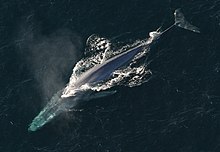
Back Blouwalvis Afrikaans Blauwal ALS Balaenoptera musculus AN حوت أزرق Arabic حوت ازرق ARZ Balaenoptera musculus AST Megenol (Balaenoptera musculus) AVK निलहा व्हेल AWA Göy balina Azerbaijani Блакітны кіт Byelorussian
| Blue whale Temporal range: Early Pleistocene – Recent
| |
|---|---|

| |
Adult blue whale
(Balaenoptera musculus) | |
Size compared to an average human
| |
| Scientific classification | |
| Domain: | Eukaryota |
| Kingdom: | Animalia |
| Phylum: | Chordata |
| Class: | Mammalia |
| Order: | Artiodactyla |
| Infraorder: | Cetacea |
| Family: | Balaenopteridae |
| Genus: | Balaenoptera |
| Species: | B. musculus
|
| Binomial name | |
| Balaenoptera musculus | |
| Subspecies | |
| |

| |
| Blue whale range (in blue) | |
| Synonyms | |
| |
The blue whale (Balaenoptera musculus) is a marine mammal and a baleen whale. Reaching a maximum confirmed length of 29.9 meters (98 ft) and weighing up to 199 tonnes (196 long tons; 219 short tons), it is the largest animal known ever to have existed.[3][a] The blue whale's long and slender body can be of various shades of greyish-blue dorsally and somewhat lighter underneath. Four subspecies are recognized: B. m. musculus in the North Atlantic and North Pacific, B. m. intermedia in the Southern Ocean, B. m. brevicauda (the pygmy blue whale) in the Indian Ocean and South Pacific Ocean, and B. m. indica in the Northern Indian Ocean. There is also a population in the waters off Chile that may constitute a fifth subspecies.
In general, blue whale populations migrate between their summer feeding areas near the poles and their winter breeding grounds near the tropics. There is also evidence of year-round residencies, and partial or age/sex-based migration. Blue whales are filter feeders; their diet consists almost exclusively of krill. They are generally solitary or gather in small groups, and have no well-defined social structure other than mother–calf bonds. The fundamental frequency for blue whale vocalizations ranges from 8 to 25 Hz and the production of vocalizations may vary by region, season, behavior, and time of day. Orcas are their only natural predators.
The blue whale was once abundant in nearly all the Earth's oceans until the end of the 19th century. It was hunted almost to the point of extinction by whalers until the International Whaling Commission banned all blue whale hunting in 1966. The International Union for Conservation of Nature has listed blue whales as Endangered as of 2018. It continues to face numerous man-made threats such as ship strikes, pollution, ocean noise, and climate change.
- ^ Reilly, S. B.; Bannister, J. L.; Best, P. B.; Brown, M.; Brownell, R. L. Jr.; Butterworth, D. S.; Clapham, P. J.; Cooke, J.; Donovan, G. P.; Urbán, J. & Zerbini, A. N. (2018). "Balaenoptera musculus". The IUCN Red List of Threatened Species. 2018: e.T2477A9447146. doi:10.2305/IUCN.UK.2008.RLTS.T2477A9447146.en.
- ^ "Appendices | CITES". cites.org. Retrieved 14 January 2022.
- ^ Zimmer, Carl (29 February 2024). "Researchers Dispute Claim That Ancient Whale Was Heaviest Animal Ever - A new study argues that Perucetus, an ancient whale species, was certainly big, but not as big as today's blue whales". The New York Times. Archived from the original on 29 February 2024. Retrieved 1 March 2024.
- ^ Bianucci, G.; Lambert, O.; Urbina, M.; Merella, M.; Collareta, A.; Bennion, R.; Salas-Gismondi, R.; Benites-Palomino, A.; Post, K.; de Muizon, C.; Bosio, G.; Di Celma, C.; Malinverno, E.; Pierantoni, P.P.; Villa, I.M.; Amson, E. (2023). "A heavyweight early whale pushes the boundaries of vertebrate morphology". Nature. 620 (7975): 824–829. Bibcode:2023Natur.620..824B. doi:10.1038/s41586-023-06381-1. PMID 37532931. S2CID 260433513.
- ^ Cite error: The named reference
MP24was invoked but never defined (see the help page). - ^ Cite error: The named reference
Bruhathkayosaurus2023was invoked but never defined (see the help page).
Cite error: There are <ref group=lower-alpha> tags or {{efn}} templates on this page, but the references will not show without a {{reflist|group=lower-alpha}} template or {{notelist}} template (see the help page).
© MMXXIII Rich X Search. We shall prevail. All rights reserved. Rich X Search
